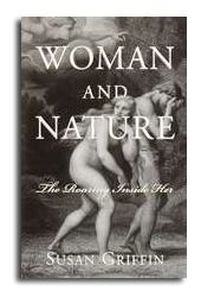|
Woman and Nature: The Roaring Inside Her by Susan Griffin is an ecofeminist book telling of how science, reason and thought throughout history lead to the domination of women and nature. I love her way of writing, 'it is decided', 'it is said', 'it is written'... the timeline of thoughts that now seem so ridiculous when stated in this way, yet underneath it is still a truth we hold in some way to this day. The mysteries of our bodies have not been entirely solved, women still do not know their own bodies. These 'primitive' thoughts are still thought in some places, by some people today... and so are not primitive at all, but exist in the here and now, along with us. Women are less in spirit ''And it is said that the souls of women are small.'' Women are less in body ''(And it is written that women, on discovering they have ovaries, are liable to become arrogant through this knowledge.) And we seek dumbness.'' Women are less in sexuality ''And it is said that all girls are born castrated.'' Women are a great mystery, like nature ''of the nature of earth, rock, river, cloud, light, wind, breath, flesh, of mules, of horses, of birds, of the body of woman, womb, breast, vulva, hair, it is acknowledged these are still unknown.'' Women are to be conquered, like land ''a countrey that hath yet her mayden head, never saht, turned, nor wrought.'' - Sir Walter Raleigh, discovery of Guiana. ''This wild abyss, the womb of nature and perhaps her grave.'' - John Milton, Paradise lost All set out this way, sentences and sentences, words and words, phrases and phrases, some alien, some only too recognisable, shows how deep the psyche of separation from nature, from men, from ourselves has fallen. That people think, write, assume these things without considering the depth of damage that may be done from these words. The power of words. The beliefs and 'truths' that arise from one simple thought. And untangling it all is seemingly impossible. Yet the damage is still being done, we see the suppression of women, and we see the destruction of our environments, that these words and sentences helped to create. But there is an ironic beauty in this book. Because Susan Griffin is woman, and she is nature, and she can look at these words, set them down, illuminate them, show them in their grievous ridiculousness, and recreate them as beautiful, as poetry. There is beauty in her comparisons of a women's dressing room and a show horse dressage, of a caged lion that could well speak of an imprisoned woman. She tells two stories at once... ''We heard of this woman who was out of control. We heard that she was led by her feelings. That her emotions were violent. That she was impetuous. That she violated tradition and overrode convention. That certainly her life should not be an example to us. (The life of the plankton, she read in this book on the life of the earth, depends on the turbulence of the sea).'' She takes all, from everywhere, to weave deeply into societies thoughts... ''And so it is Goldilocks who goes to the home of the three bears, Little Red Riding Hood who converses with the wolf, Dorothy who befriends a lion, Snow White who talks to the birds, Cinderella with mice as her allies, the Mermaid who is half fish, Thumbelina courted by a mole. (And when we hear in the Navaho chant of the mountain that a grown man sits and smokes with bears and follows directions given to him by squirrels, we are surprised. We had thought only little girls spoke with animals.) '' We go on a timeless journey of humanities rises and falls, and feel keenly, with our own womanly bodies, all that is said and all that is written. And at the end is a breath of fresh air, that we may find ourselves, our own bodies, without these thoughts, limitations, assumptions, if we go back to our original home. Just Earth. ''I have known her all my life, yet she reveals stories to me, and these stories are revelations and I am transformed... This Earth is my sister, I love her daily grace, her silent daring, and how loved I am... and I do not forget what she is to me, what I am to her.'' Related Posts Ecofeminism
1 Comment
Mandy
1/3/2017 09:17:26 pm
How beautifully rich in its language and feeling...
Reply
Leave a Reply. |
Archives
February 2017
Categories |

 RSS Feed
RSS Feed